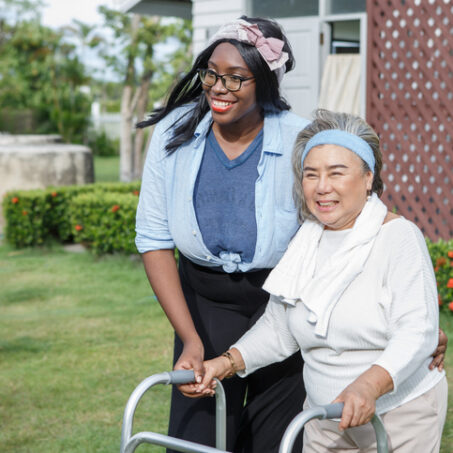On February 9, Department of Housing and Urban Development (HUD) will publish LeadingAge-driven guidance on the supportive services fee for Section 202 PRAC properties. The additional budget allotment helps HUD-assisted properties provide independent living services to older adults aging in community.
The guidance outlines eligible and ineligible activities under the supportive services fee, as well as the process for requesting and implementing it into property budgets via supportive services plans. The fee, which can total up to $15 per unit per month at Section 202 PRAC properties, funds services and activities that support independent aging (Section 202 PRACs in the process of converting under HUD’s Rental Assistance Demonstration (RAD) program are eligible for up to $27 per unit per month). The fee is only available to add to Section 202 PRAC budgets and is not available for Section 202/8 properties.
In 2021, LeadingAge alerted HUD to the need for guidance for the supportive services fee, which was authorized for HUD’s Section 202 program but not officially implemented through agency guidance. Since then, LeadingAge has worked with its Housing and Services workgroup to provider feedback to HUD as the agency developed implementation guidance; LeadingAge has also worked with many housing provider members to add the fee to budgets.
LeadingAge is thrilled to see guidance issued from HUD on this important funding source for services in senior housing, and we look forward to working with more members to add the fee to budgets.
To join the Housing and Services workgroup, please contact Juliana (jbilowich@leadingage.org).
More resources about the supportive services fee, including sample supportive services plans and a policy brief on HUD’s new guidance, are forthcoming from LeadingAge.
Process for Requesting the Supportive Services Fee
Properties will submit or update their property’s supportive services plan and cover letter to their HUD-assigned Account Executive at their next contract renewal date. Properties should include the supportive services funds expense amount in “Line 6900” of the PRAC budget. Properties need to meet several threshold requirements, and funds may not carry-over year over year.
Account Executives will review the amount requested, the eligibility, and responsiveness to resident need.
Eligible Activities to be funded by the Supportive Services Fee
According to HUD Notice H-2023-02, the following services are eligible to be funded by the supportive services fee and provided to an individual resident:
- Meal services. To meet nutritional needs, such as grocery shopping, meal preparation service, or supporting collaboration with a food bank; and, meals, if not covered by a food assistance program such as Supplemental Nutritional Assistance Program (SNAP) (formerly called food stamps).
- Housekeeping aid. Assistance with tasks in residents’ units such as cleaning, laundry, trash removal.
- Personal assistance. Assistance with activities of daily living (ADLs) (i.e., basic self-care tasks that include, but are not limited to, bathing, dressing, eating, transferring (e.g.., getting in and out of chairs, grooming, using the toilet, and walking), and instrumental activities of daily living (IADLs) (i.e., skills related to independent living that include, but are not limited to, meal planning and preparation, managing finances, shopping for food, clothing, and other essential items, performing essential household chores, communicating by phone or other media, and traveling around and participating in the community). IADLs include escort services to accompany or physically assist a resident who is unable to travel to medical appointments or wait alone.
The following are services that are eligible to be funded by the supportive services fee but must be provided to the entire community:
- Transportation services. To support transportation of residents for off-site group health and wellness programs and activities, essential shopping, medical appointments, and other essential services.
- Health-related services.
- End-user equipment necessary to support telehealth for residents. If the property offers such equipment, all residents must have access, and technical support (i.e., digital navigation) must be provided. The number of computer devices purchased should not exceed ten percent (10%) of the total number of units. Equipment maintenance must be covered by supportive services funds.
- Fees for activities and educational programs that address common health and wellness challenges of residents including health behaviors (e.g., disease management, fall prevention, fitness/exercise, or nutrition education).
- Programs and activities to reduce social isolation and encourage social interaction, which have a positive impact on health, including supplies for group activities (e.g., arts and craft materials, puzzles, games). If congregate activities have been suspended for public health reasons, supplies for recreational activities to help enforce social distancing required in a public health emergency are allowable.
- Materials, supplies, and limited physical modifications to common areas to support health and wellness programs, activities, or events (e.g., exercise equipment, pedometers, lumber to build a raised garden bed, gardening supplies, instructional books, health journals, or videos). This includes ingredients and equipment necessary to teach hands-on classes on nutrition and healthy meal preparation.
- Educational materials that may be used or shared with participants around specific health needs (e.g., posters, brochures, booklets). f. Discussion group facilitator to assist residents struggling with issues that may impede the ability to manage their own needs (e.g., grief, loneliness, depression, trauma).
- Individual education/counseling sessions to assist residents who could benefit from a more intensive or focused interaction (e.g., counseling to address hoarding, nutrition, grief).
- Access to medical services (e.g., transportation, aide to accompany resident to medical appointment).
- Fees for education and outreach. To protect residents from telemarketing and internet fraud and identity theft.
Ineligible Uses of the Supportive Services Fee
- Programs and services funded by federal, state, and local government agencies; Medicare, Medicaid, or private insurance; or community-based, philanthropic, and other sources or that duplicate such services.
- Expenses related to providing safe, decent, and affordable housing, and relocation. Supportive services funds may not be used to cover basic housing services for residents (e.g., clean water, utilities, pest control, maintenance, upkeep, and improvements).
- Service Coordinator Program costs. The cost for Service Coordinators are separate eligible expenses from the supportive services allowance (up to $15 per unit per month) in the Section 202 PRAC operating budget. Please see Handbook 4381.5, REV-2, Chapter 8 for discussion of eligible uses of Service Coordinator funds.
- The direct cost of medical services. Project owner/management agent/service coordinators may coordinate with appropriate third parties (e.g., federal, state, and local government agencies; Medicare, Medicaid, or private insurance; or community-based and philanthropic sources) to have such services provided by those entities, consistent with state and local law.
- Compliance with physical accessibility requirements, program access requirements, and providing reasonable accommodations (e.g., physical modifications to units, language interpreters). Owners of federally assisted housing are required to provide applicants and residents with disabilities reasonable accommodations that are needed to enable those individuals to make effective use of the federal programs and provide equal access to persons with limited English proficiency. Reasonable accommodation expenses are funded by Reserve for Replacement, Residual Receipts, project operations or owner contributions.
- Promotional materials, including but not limited to, T-shirts, water bottles, coffee cups, or hats.
- Admission tickets to entertainment events and locales.
- Party refreshments.
- Wi-Fi networks and/or internet access for individual residents in their units.
- Computer or telecommunication devices for individual residents or units.

 Shutdown Week Three: Impact of Ongoing Closure on Affordable Housing
Shutdown Week Three: Impact of Ongoing Closure on Affordable Housing Colleagues on the Move, February 18, 2026
Colleagues on the Move, February 18, 2026


